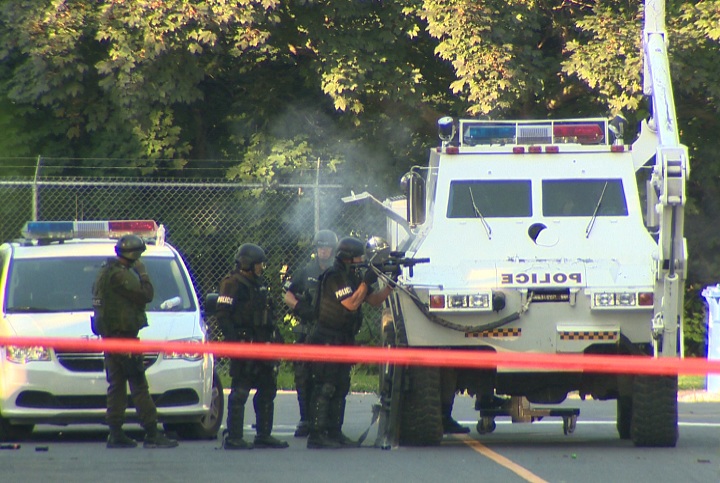MONTREAL – The 71-year-old man arrested Wednesday after an armed standoff had a large collection of firearms that Montreal police say they knew about because of Canada’s gun registry.

Isidore Havis is facing a number of charges after his arrest.
“He’s going to be facing charges of assault with a weapon causing bodily harm, uttering threats and mischief over $5000,” confirmed Montreal police spokesperson Daniel Lacoursière.
Havis was expected to appear in court Thursday afternoon, but his lawyer, Jeff Boro, told Global News that his client won’t be making an appearance because he was too confused.
Read more: Armed standoff in Montreal ends with arrest and firearm seizure
After Havis was arrested on Wednesday, the tactical team seized around 180 firearms and 40 bayonets, which are stabbing blades that can be attached to the muzzle of a rifle for use in hand-to-hand fighting.
“The investigators checked out the Canadian registry of firearms,” noted Lacoursière. “They were be able to see that the man had over 180 firearms registered to that address.”
- 2 teens charged with murder in case of 16-year-old killed outside Halifax mall
- Green Party deputy leader given jail sentence for Fairy Creek old growth protests
- Cars torched, explosions heard in suspected arson in Montreal neighbourhood
- Gas station clerk stabbed several times during violent attack at Ultramar in Montreal
Police wouldn’t elaborate on whether the registry played a role in the outcome.
Blair Hagen, the executive vice-president of communications for Canada’s National Firearms Association told Global News that he doesn’t believe that accessing the registry would have affected how the police handled the incident.
“Obviously not. It’s a proven fact that police always assume there are firearms present.”
Hagen also noted that access to the now-defunct long-gun registry would not have been a factor in this case.
“When the initial inquiry to find out whether he lawfully owned firearms, it would been done through the licencing system.”
He’s referring to the Canadian Firearms Registry, where anyone who uses or owns a firearm in Canada and has applied for a permit, is listed.
Hagen believes that any restricted or prohibited firearms that Havis owned would have been on the central registry for restricted or prohibited firearms.
Gun control advocate Heidi Rathjen disagrees. The survivor of the École Polytechnique massacre told Global News that the incident shows how critical it is for police to have access to this kind of information.
“The registry is important to protect police,” she said.
“Ninety-five per cent of police who were shot on the job were shot with long guns. Not with restricted guns. These guns are dangerous and police need to know who owns them.”
She was also concerned about the fact that people with a mental illness may have a legal permit for a gun – or over 180 in this case.
“The screening process just happens once you apply for the permit,” she noted.
“It has to be renewed every five years, but the system really counts on the public to alert the police if an individual shows signs of mental illness, suicidal behaviour or violent behaviour.”
The armed standoff ended Wednesday morning after the septugenarian had been barricaded inside his home in Montreal’s Cote-Saint-Luc neighbourhood for over 20 hours.
In pictures: Armed standoff ends
The incident began after Havis suddenly threatened two Hydro-Quebec workers on his property. When police approached the house, he fired at officers.
READ MORE: Montreal police officer injured in Cote St. Luc standoff
A safety perimeter was set up, and several neighbouring homes were evacuated.
At one point, police saw that the suspect was not holding his weapon.
“He was considered less of a threat, so the tactical team moved in, firing two rubber bullets at the suspect,” said Lacoursière.
Conflict negotiations expert Martin Coursy credited the SWAT team’s handling of the situation.
“They weren’t going in hard,” he noted. “They tried to negotiate, win time and end the standoff without bloodshed.”
Still, the incident had an impact on residents.
Ten-year-old Dolores Villaneuva lives across the street with her family and told Global News that her family were frightened.
“We heard lots of gun noises and running and screaming and smashing, so all of us were scared,” she said.
– With files from Aalia Adam, Sarah Volstad and The Canadian Press













Comments